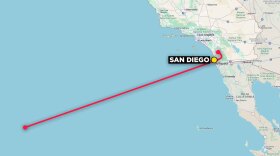Megain McCall tried hard to forget the day her life changed forever.
It was around 2009, she said, when she was 28 years old. She was driving from San Diego with her aunt and mother to see her dying brother in Texas. At a Texas checkpoint, a patrol dog signaled the car.
“I remember being super confident because I know I didn’t have anything,” McCall said.
But an officer found a bag of marijuana candy — her mother’s, she said. Marijuana — even medical — wasn’t legal in Texas.
“I wasn’t going to let her go to jail,” McCall said, “so, I took claim of it.”
When the sheriff came to pick her up, she said she would be charged with a felony.
McCall had hoped to become an engineer at Qualcomm where her brother worked. But with the cannabis charge on her record, she found it nearly impossible to get jobs outside of kitchens. The yes-or-no felony checkbox left no room for the specifics of her story.
“I didn’t get to say, ‘Yeah, but I took a charge for my mom,’” she said.
McCall no longer qualified for subsidized housing. Sometimes, the charge even prevented her from volunteering at schools.
Black and white people use cannabis at similar rates. But in San Diego County, Black people were arrested for it at a rate five times higher than white people, and charged more severely.
McCall said almost everyone she knows has a cannabis charge.
Cannabis “is actually part of our culture here in San Diego,” she said. “Always has been, my entire life.”
The California Reparations Task Force estimated the war on drugs cost each Black Californian more than $100,000. And the harm went beyond finances.
McCall said the criminalization of cannabis cost her brothers' life, who died after turning to harder drugs.
“Because the harder drugs leave your body sooner,” she said. “So when they end up on probation and things of that nature, they don't want to smoke weed because they can't get it out of their system fast enough. And that ended up taking my brothers out.”
In 2016, California legalized recreational marijuana. Suddenly, some were getting rich off the very thing that had cost McCall so much.
“When it crossed over from medical to recreational, I kind of felt like, all right, here’s our chance,” she said.
But then she read the rules.
You have to already be renting space when you apply for a license to operate a cannabis business. It can take up to a year for city staff to respond with a decision. McCall couldn’t afford the rental costs without a guarantee she could make her money back.
And it prohibited outlets within 1,000 feet of certain structures, including churches — something San Diego’s Black neighborhoods had in abundance.
Like many of the people most harmed by the war on drugs, McCall was frozen out of the market.
“No one likes to give us loans,” she said, “so, we were stuck between a rock and a hard place.”
The majority of companies with Black owners are denied loans — a rate twice as high as white business owners. Credit scores have historically not considered rent or utility payments, keeping the majority of Black Americans who don’t own homes from using housing expenses to build credit.
McCall likened the regulations to a trick: “I’m not going to tell you no, but I’m going to tell you you need this stuff, and I’m not going to give it to you.”
In 2020, McCall said a friend invited her to pre-planning meetings for the city’s cannabis social equity program. She said she had to educate herself to even be able to participate.
“I had no idea what was being said. No clue.” she said. “I don’t know legal jargon.”
But she discovered her presence made a difference. She told city staff she didn’t qualify for the program because her charge was out-of-state. By the next meeting, they had rewritten the rules.
“I saw I had a little bit of power to make change for people,” McCall said.
McCall and others who were advising the city requested 36 equity licenses. But a license alone is not enough. They are asking that city code be rewritten to remove some of the biggest barriers, like the existing-rental requirement.
They’re also asking for slightly extended operating hours, reduced zoning restrictions, for licensing, permitting and inspection fees to be waived or reduced and forgivable loans. Starting a cannabis business can cost hundreds of thousands of dollars.
Some of the program’s hopeful participants described it as a way for low-income neighborhoods in San Diego’s southeast to “feed ourselves,” in contrast to grant-funded programs that come in to study the community and leave. They said it’s an unprecedented chance for them to build something previously inaccessible — generational wealth.
If McCall gets a license, she plans to open a warehouse and hire people from neighborhoods in southeast San Diego like Paradise Hills — where she grew up — and Spring Valley in East County, where she currently lives. If the other applicants do the same, they could create a shared community bank between them.
“My neighborhood needs something for the park? They don’t have to go to city hall and beg for it,” McCall said, energy filled her voice.
“We’re looking for a teen drop-off center, right? They can come to us. And there’s no question,” she said, driving her finger toward the ground in benevolent command, “Yes, build it!"
“My whole southeast is gonna be different,” she said.
City staff is currently deciding how to use $1 million dollars allocated from the city budget to the cannabis equity program. They anticipate having a draft of equity program legislation as soon as this fall.
San Diego County will hold a virtual listening session Aug. 8 at 6 p.m. for its own version of the program.





